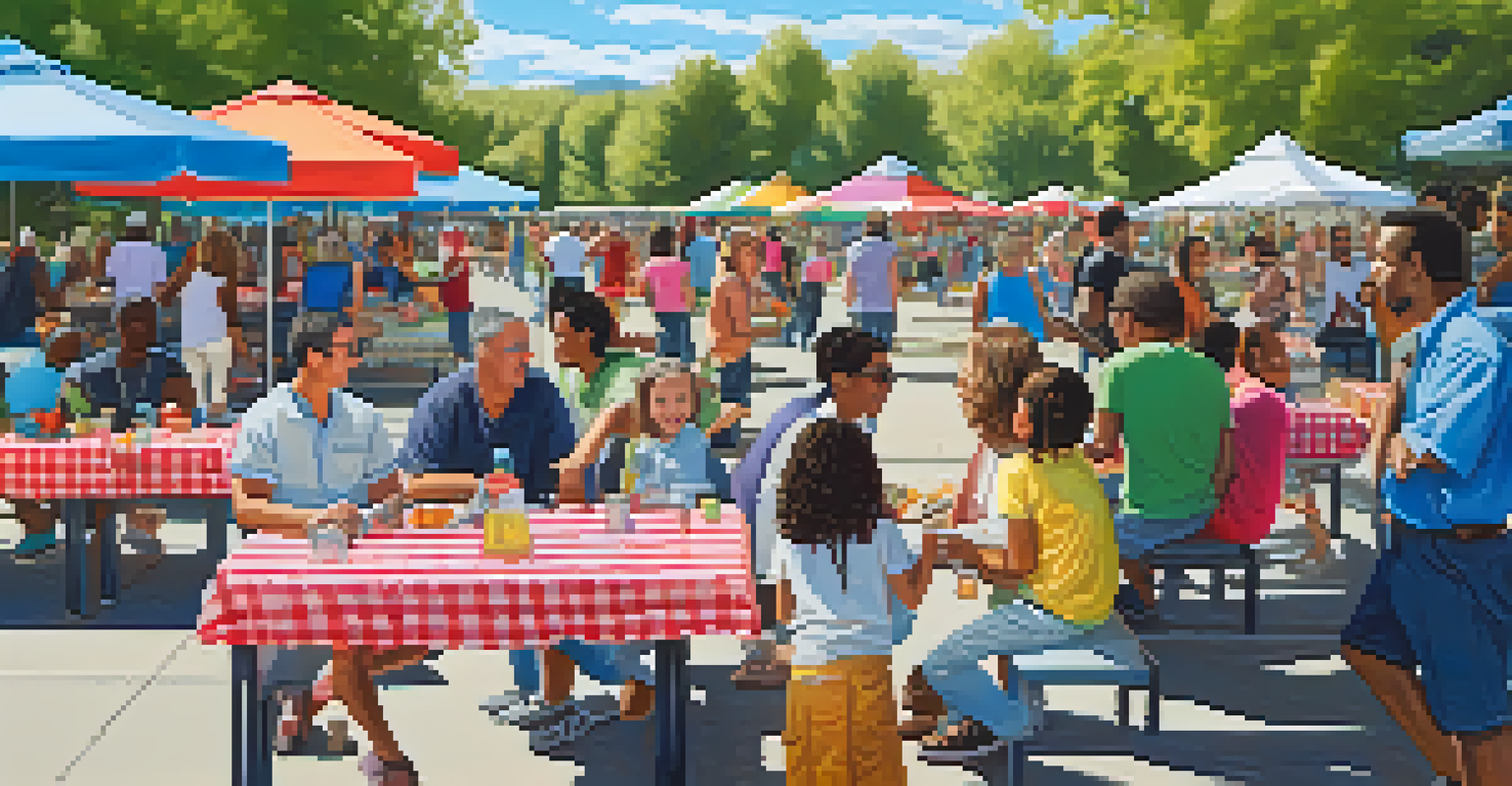Utah's Political Parties: Their Influence and Key Differences

An Overview of Utah's Political Landscape
Utah's political landscape is dominated by a unique blend of parties, most notably the Republican Party, which has a stronghold in the state. With its history of conservative values, the Republican Party appeals to many Utahns who prioritize fiscal responsibility and limited government. However, the political scene is not solely Republican, as there are significant influences from other parties, including the Democratic Party, which offers a contrasting perspective on various issues.
In politics, the people should be represented by those who reflect their values and beliefs.
In Utah, the dynamics of political parties are shaped by a combination of factors, including demographics, religion, and regional interests. The majority of Utah's residents are members of The Church of Jesus Christ of Latter-day Saints, which often influences voting patterns and party allegiance. This unique cultural backdrop contributes to the state's tendency toward conservative policies, but it also provides a fertile ground for discussions on diversity and inclusion within political discourse.
Understanding the political landscape in Utah requires an awareness of these influences and how they interact. While the Republican Party dominates, the presence of other parties, such as the Independent Party and smaller third parties, highlights a growing interest in alternative viewpoints. As the state evolves, so too does its political framework, making it essential for residents to engage with and understand their options.
The Republican Party's Dominance in Utah
The Republican Party has been the dominant force in Utah politics for decades, often winning elections by significant margins. This dominance can be attributed to a combination of factors, including the party's alignment with the conservative values prevalent in the state. Issues such as limited government, tax cuts, and personal freedoms resonate with many Utahns, solidifying the party's support among voters.

Moreover, the Republican Party's strong grassroots organization plays a crucial role in its success. Local chapters engage in community outreach, helping to mobilize voters and spread the party's message. This hands-on approach not only fosters loyalty but also ensures that the party remains attuned to the needs and concerns of its constituents.
Republican Dominance in Utah Politics
The Republican Party's stronghold in Utah is attributed to its alignment with the state's conservative values and effective grassroots organization.
However, the Republican Party's dominance is not without challenges. As younger generations become more politically active, there is a noticeable shift in perspectives, particularly on social issues. This generational change could potentially lead to a more competitive political environment in the future, prompting the party to adapt its strategies to engage a diverse electorate.
The Role of the Democratic Party in Utah
The Democratic Party in Utah, while often overshadowed by Republicans, plays a vital role in providing alternative perspectives on key issues. Focused on social justice, environmental protection, and healthcare reform, the Democratic Party appeals to a segment of the population that seeks progressive change. Their efforts are particularly evident in urban areas like Salt Lake City, where a more diverse electorate resides.
The true test of a democracy is the ability of its citizens to engage in constructive dialogue.
Despite its smaller size, the Democratic Party has made strides in recent elections, reflecting a growing desire for change among Utahns. Campaigns focused on local issues, such as education and public infrastructure, have helped the party resonate with voters. By addressing concerns that matter to everyday people, Democrats are slowly gaining traction in a largely conservative state.
The Democratic Party's challenge lies in overcoming the perception that it is out of touch with Utah's values. To combat this, party leaders are emphasizing community engagement and collaboration on bipartisan initiatives. By fostering relationships with independent voters and moderates, the Democratic Party aims to broaden its appeal and create a more balanced political dialogue in Utah.
The Independent Party: A Rising Force
The Independent Party has emerged as a notable player in Utah's political scene, drawing individuals who are disenchanted with the traditional two-party system. This party appeals to voters who prioritize issues over party affiliation, offering a platform that emphasizes pragmatism and cooperation. As more Utahns identify as independents, the party's influence is expected to grow.
One of the key strengths of the Independent Party is its flexibility in addressing a wide range of issues. By avoiding strict ideological boundaries, the party can attract a diverse group of voters who may not align with the rigid platforms of the two major parties. This adaptability allows for a more inclusive approach to governance, which can resonate with citizens looking for practical solutions.
Democrats Offer Alternative Perspectives
Despite being a minority, the Democratic Party plays a crucial role in Utah by focusing on social justice and local issues to connect with voters.
Nevertheless, the Independent Party faces challenges in establishing a foothold within Utah's political structure. Limited resources and recognition compared to the larger parties make it difficult to compete in elections. However, as the political climate continues to shift, the Independent Party could play a crucial role in shaping the future of Utah politics.
Key Differences Between Political Parties
Understanding the key differences between Utah's political parties is essential for voters looking to make informed decisions. The Republican Party tends to prioritize fiscal conservatism, advocating for lower taxes and reduced government intervention. In contrast, the Democratic Party often emphasizes social equity and environmental sustainability, pushing for policies that address broader societal issues.
The Independent Party offers a unique alternative, focusing on practical solutions rather than strict ideological lines. This approach allows independents to attract voters from both sides of the aisle, appealing to those who are more interested in effective governance than party loyalty. By highlighting these differences, voters can better align their choices with their personal values and priorities.
Moreover, understanding these distinctions can foster more meaningful conversations among voters. By engaging with differing perspectives, citizens can contribute to a more vibrant political dialogue that enhances democratic participation. Ultimately, an informed electorate is crucial for the health of Utah's democracy.
The Impact of Religion on Political Affiliations
Religion plays a significant role in shaping political affiliations in Utah, primarily due to the influence of The Church of Jesus Christ of Latter-day Saints. Many Utahns identify strongly with their faith, which often guides their political beliefs and voting patterns. This connection between religion and politics has helped solidify the Republican Party’s dominance within the state.
However, the influence of religion is not uniform across all demographics. As more diverse populations settle in Utah, varying religious beliefs are beginning to reshape the political landscape. This diversification introduces new perspectives and challenges the traditional notions of political alignment based on faith.
Independents Challenge Traditional Politics
The rise of the Independent Party reflects a growing discontent with the two-party system, appealing to voters who prioritize pragmatic solutions over strict ideologies.
Understanding the intersection of religion and politics in Utah is crucial for grasping the nuances of the state's electoral dynamics. By recognizing how faith influences political choices, voters can better understand the motivations behind different parties and candidates. This awareness fosters a more inclusive political environment that encourages dialogue and cooperation among diverse groups.
The Future of Political Parties in Utah
The future of political parties in Utah is poised for transformation as demographic changes and evolving social attitudes shape the electorate. With younger voters increasingly interested in progressive issues, there is potential for a shift in the political landscape. This change could lead to more competitive elections and a greater diversity of viewpoints in the state's political discourse.
In addition, the rise of independent voters signifies a growing desire for alternatives to the traditional two-party system. As these voters seek candidates who prioritize issues over party lines, political parties may need to adapt their strategies to remain relevant. This could result in more collaboration across party lines, fostering a culture of compromise and bipartisanship.

Ultimately, the future of Utah's political parties hinges on their ability to engage with the electorate and address the concerns of a diverse population. By embracing change and prioritizing open dialogue, Utah's political landscape can evolve to better reflect the values and aspirations of all its residents.